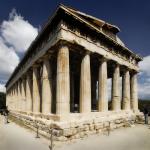|
This section contains 480 words (approx. 2 pages at 300 words per page) |

|
525/4-456/5 B.C.E.
Tragic Dramatist
Claim to Fame. Aeschylus is the earliest of the three Greek tragedians, whose work has survived in more than fragmentary form, and so is the first extant European dramatist. If he was not the first tragedian, he seems to have been the founder of what is recognized as the distinctive genre of tragedy, in respect of its production and its dramatic possibilities. Born of an aristocratic Athenian family, he took part in the battles of Marathon (490 B.C.E.) and Salamis (480 B.C.E.) against the invading Persians. The report and consequences of the Greek victory at Salamis are the focus of his first surviving play, Persians (472 B.C.E.). His other surviving plays are Seven Against Thebes (467), Suppliant Women (463), and a trilogy consisting of Agamemnon, Libation Bearers, and Eumenides called Oresteia (458). The authenticity of a seventh play, Prometheus Bound, is...
|
This section contains 480 words (approx. 2 pages at 300 words per page) |

|




